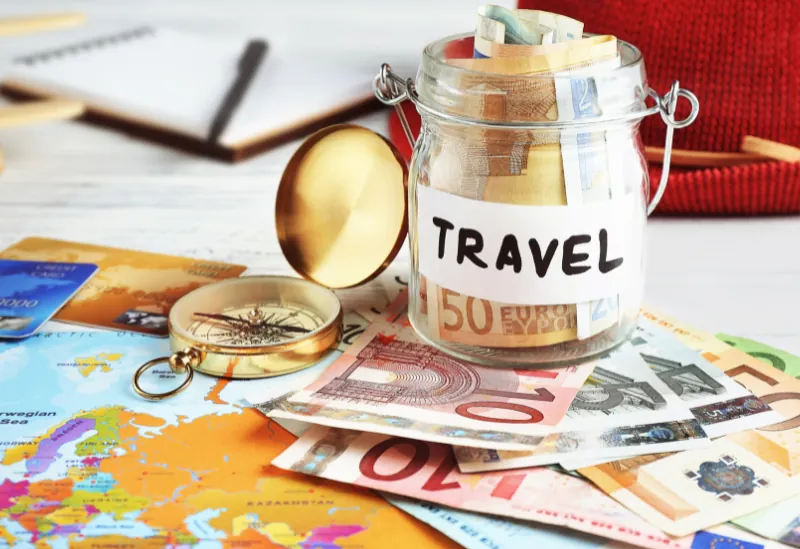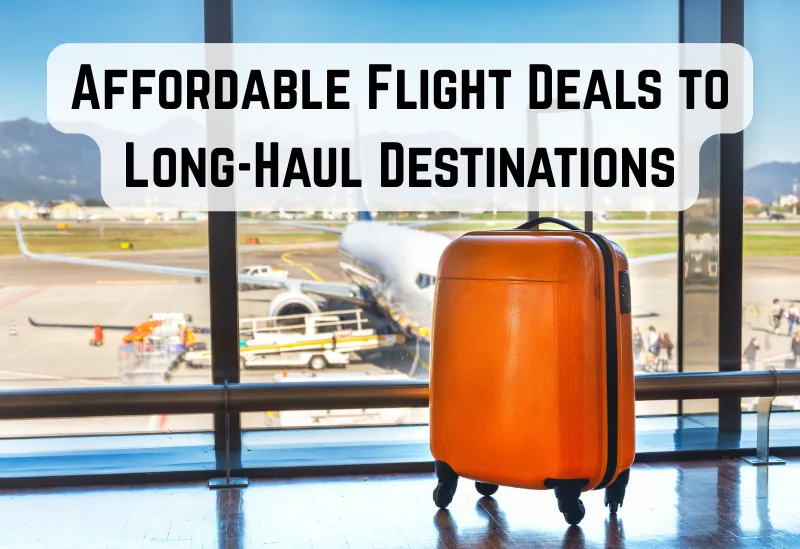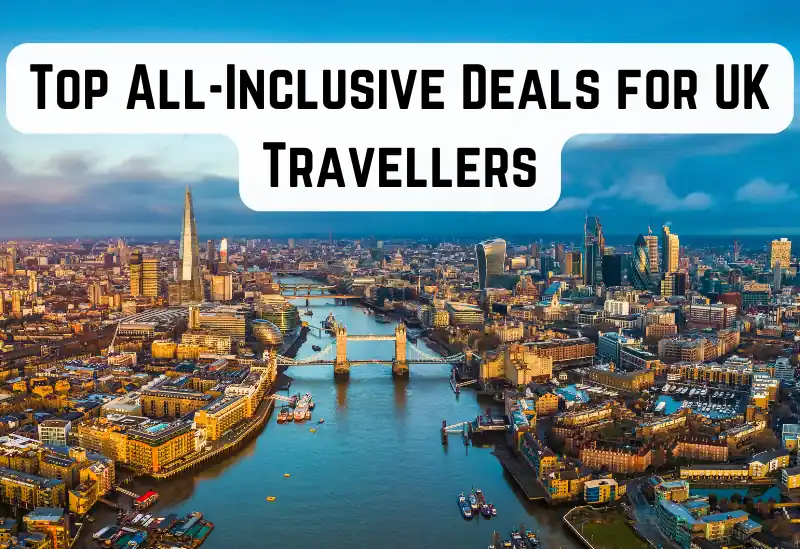Travelling the world doesn’t need to drain your bank account. We’ve spent years exploring amazing destinations whilst keeping our expenses low, and we’re excited to share our top money-saving tips with you.
Planning ahead and being flexible with your travel dates can save you a lot – up to 60% on flights and accommodation. These simple changes to how you book your trips can make an expensive holiday more affordable.
Smart choices about where and when to travel make a massive difference to your budget.
We’ll show you ways to experience amazing destinations for less, from choosing wallet-friendly locations to finding the best local spots cheaper.
How To Travel On A Budget: Smart Ways To Save Money On Your Trip
Planning a memorable holiday doesn’t need to cost a lot. Smart choices and clever planning can help create amazing travel experiences for less.
Why Is Budget Travel Important?
Budget travel helps us make the most of our money whilst exploring new places. We can stretch our funds further and travel for longer periods by being mindful of costs.
Many people believe travelling requires big savings, but that’s not true. By travelling smartly, we can experience incredible destinations at a fraction of typical prices.
Budget travel teaches valuable money management skills. Being resourceful with our funds helps develop habits that benefit other areas of life too.
How Much Should You Budget For A Trip?
A typical daily budget ranges from £30-£100 depending on the destination. Finding cheap holiday deals can really reduce accommodation costs.
Consider these essential expenses:
- Accommodation: 30-40% of budget
- Transport: 20-25% of budget
- Food: 20-25% of budget
- Activities: 10-15% of budget
- Miscellaneous: 5-10% of budget
Travelling during off-peak seasons can cut costs by 20-50%. Booking 3-6 months ahead usually secures better rates.
How To Plan An Affordable Vacation Without Sacrificing Fun
Pack light to avoid excess baggage fees. One carry-on bag can save £20-50 per flight.
Choose destinations where our money goes further. Eastern Europe, Southeast Asia, and South America offer great value.
Use public transport instead of taxis. Walking helps us discover hidden gems whilst saving money.
Book city breaks midweek rather than weekends. We don’t all know but hotels often reduce rates by 30% during these quieter periods.
Stay in hostels or rent apartments with kitchen facilities. Cooking some meals saves a lot compared to eating out for every meal.
Travel slowly to reduce transportation costs and truly experience each destination. Rushing between places increases expenses unnecessarily.
How To Save Money On Travel Tickets, Flights, And Discount Codes At Savzz.co.uk
Smart planning and timing make all the difference in securing the best travel deals. We’ve gathered proven ways to help you slash transportation costs and make the most of available discounts.
Where To Find Cheap Flight Deals And Promo Codes
Using price comparison tools like Skyscanner and Google Flights helps track fare changes across multiple airlines. These platforms display prices for an entire month, making it easier to spot the cheapest days to fly.
Budget airlines often offer big savings on short-haul routes. Watch for flight discount codes during off-peak seasons.
Set price alerts for your desired routes. Airlines often release deals on Tuesday afternoons and Wednesday mornings.
Flying mid-week typically costs less than weekend travel. Consider early morning or late evening flights for better rates.
How To Save On Train And Bus Tickets With Discounts
Book train tickets 12 weeks in advance when fares first become available. Split tickets can reduce costs by breaking longer journeys into shorter routes.
Student and youth discounts offer up to 33% off regular fares. Remember to carry valid ID when travelling.
Sign up for train company newsletters to receive alerts about flash sales and special offers.
Coach travel provides huge savings compared to trains. Night services save both time and accommodation costs.
Why Booking In Advance Helps You Save On Transportation
Booking 6-8 months ahead often secures the lowest airfares, especially for peak travel periods. Airlines release tickets in batches, with early birds getting the best prices.
Train companies offer advance fares at real discounts. These tickets sell out quickly but can save up to 80% compared to day-of travel.
Most low-cost city breaks require early booking for the best value.
Flexibility with dates increases chances of finding cheaper options. Mid-week departures typically cost less than weekends.
How To Use Travel Cashback And Reward Programmes For Extra Savings
Join airline loyalty programmes to earn points on every journey. Many schemes offer bonus points for booking directly through their websites.
Credit card rewards can reduce travel costs. Look for cards offering air miles or travel-specific perks.
Sign up for airline newsletters to receive exclusive member discounts and bonus point offers.
Consider annual travel cards if you’re a frequent traveller. These often include perks like airport lounge access and travel insurance.
Why Travel During Off-Peak Seasons Can Save You More
Travelling outside peak tourist periods unlocks massive savings on everything from flights to accommodation, whilst giving us a more authentic experience with fewer crowds to navigate.
How Shoulder Season Travel Lowers Costs
Hotel rates often drop by 20-45% during shoulder season months – those sweet spots between peak and off-peak periods. We find fantastic deals in Mediterranean destinations during May and September, when the weather remains pleasant but prices drop.
Flight costs typically decrease by 30% or more during these transitional months. Airlines compete for fewer travellers, leading to better deals.
Popular tourist attractions become much more accessible. We can explore museums, historical sites, and local landmarks without long queues or premium pricing.
Where To Find The Best Off-Season Travel Destinations
Prime European destinations for off-season travel:
- Venice in November-February
- Greek Islands in March-April
- Scottish Highlands in October
- Provence in April-May
Caribbean islands offer excellent value from June to November. While this coincides with hurricane season, many southern islands like Aruba and Bonaire sit outside the storm belt.
Many ski resorts are affordable over summer. The Alps and Rocky Mountains provide brilliant hiking opportunities compared to winter prices.
How To Spot Last-Minute Travel Deals
Sign up for price alerts from multiple airlines to track fare fluctuations. The best deals often appear 6-8 weeks before departure dates.
Top money-saving booking tips:
- Book Tuesday afternoons for better flight prices
- Compare midweek vs weekend rates
- Check nearby airports for better deals
- Monitor social media accounts of airlines and hotels
Package holidays often see dramatic price drops 2-3 weeks before departure. Booking accommodation and flights separately can sometimes get better savings during these periods.
How To Find Cheap Accommodation Without Compromising Comfort
Smart accommodation choices can reduce travel costs while maintaining comfort and convenience during your adventures.
Where To Book Budget-Friendly Hotels And Hostels
Many hotels offer big discounts for midweek stays and off-peak seasons. We recommend booking directly through hotel websites after comparing prices across multiple platforms.
Private rooms in hostels provide an excellent middle ground between comfort and affordability. Most modern hostels feature clean facilities, secure lockers, and comfortable common areas.
Look for budget hotels near city centres rather than luxury properties – they often provide similar basic amenities at a fraction of the cost. Hotel discount codes can reduce your accommodation expenses.
We recommend subscribing to hotel newsletters to receive exclusive deals and flash sale notifications. Book rooms 3-6 months in advance for the best rates, especially during peak travel seasons.
How To Get The Best Deals On Airbnb And Vacation Rentals
Filter Airbnb listings by selecting ‘entire place’ and setting your maximum price limit. Message multiple hosts to negotiate better rates for extended stays.
Check listings slightly outside tourist hotspots – they’re often 30-50% cheaper while offering more space and amenities. Properties with newer listings often offer promotional rates to build their reviews.
Enable price alerts for your desired locations and dates. Many hosts offer substantial discounts for last-minute bookings or gaps between reservations.
Consider booking a place with a kitchen – cooking meals can offset the cost of a slightly more expensive rental.
Why House Sitting And Couchsurfing Can Be Great Free Options
House sitting connects you with homeowners who need pet and property care while they’re away. Create detailed profiles on house sitting platforms and build positive references.
Start with shorter sits to gain experience and reviews. Many assignments include use of vehicles and utilities at no cost.
Couchsurfing builds cultural connections while providing free accommodation. Meet potential hosts at local Couchsurfing events before staying with them.
Be an active community member by hosting others when possible. This builds trust and increases your chances of finding great hosts.
How Hotel Loyalty Programmes Can Save You Money
Join loyalty programmes for hotel chains you use often. Points add up quickly when booking directly through hotel websites.
Consider getting a hotel-branded credit card for bonus points on everyday purchases. Many programmes offer free nights after collecting enough points.
Take advantage of status matching between different hotel chains. This instantly grants you perks like room upgrades and late checkout.
Book reward stays during off-peak periods when points requirements are lower. Stack loyalty benefits with seasonal promotions for maximum savings.
How To Eat Cheap While Travelling Without Missing Out On Local Cuisine
Food makes up a large portion of travel expenses, yet experiencing local cuisine remains essential for an authentic journey. Smart choices can help save money whilst savouring the best local flavours.
Why Street Food And Local Markets Are Budget-Friendly
Street food stalls and local markets offer authentic cuisine at a fraction of restaurant prices. We’ve found that street vendors often specialise in one or two dishes they’ve perfected over generations.
Look for bustling stalls with queues of locals – it’s a reliable sign of quality and safety. Many street food areas have communal seating where you can chat with residents and get insider tips.
Top money-saving market tips:
- Visit during off-peak hours for better prices
- Learn basic local phrases to negotiate
- Bring small change and local currency
- Ask your accommodation staff about trusted markets
How To Save Money At Restaurants With Happy Hours And Specials
Many restaurants offer discounts during off-peak hours. Lunch menus often feature the same dishes as dinner for 30-50% less.
Best times to find deals:
- Early bird dinners (5-7pm)
- Weekend brunches
- Weekday lunch specials
- Bank holiday promotions
Sign up for local restaurant newsletters and text messages upon arrival. Tourist areas frequently have special deals that aren’t advertised widely.
What Are The Best Apps For Finding Cheap Eats?
Mobile apps have revolutionised how we find affordable dining options. Essential free apps:
- TheFork: Book tables with special discounts
- OpenTable: Earn dining points
- TooGoodToGo: Rescue surplus food at reduced prices
- Yelp: Filter by price range and special offers
Enable location services to find real-time deals near you. Many apps offer additional savings for first-time users.
How Cooking Your Own Meals Can Cut Down Costs
Book accommodation with kitchen access to prepare some meals yourself. Local supermarkets and markets provide fresh ingredients at reasonable prices.
Smart cooking strategies:
- Make breakfast in your room
- Pack lunches for sightseeing
- Cook dinner 2-3 times per week
- Buy local seasonal produce
Stock up on simple breakfast items like fruits, cereals, and breads. Share cooking duties with other travellers in hostels to split costs and try new recipes.
Consider booking accommodation near a supermarket. We’ve found this saves both money and time during longer stays.
How To Save Money On Transportation While Exploring A Destination
Smart transport choices can drastically reduce your travel costs whilst exploring new destinations. Local transport networks offer excellent value for money and help you experience a place like a local.
Why Public Transport Is Cheaper Than Taxis And Ride-Sharing
Public transport costs less than private hire options in most cities. A typical bus or train journey might cost £2-3, whilst a taxi covering the same route could set you back £15-20.
Many cities offer integrated transport systems where a single ticket works across buses, trains, and trams. This flexibility helps maximise value for each journey.
Night buses provide safe, budget-friendly travel after hours. Though service may be less frequent, the savings compared to late-night taxis are worth it.
How To Use Travel Passes And City Cards For Discounts
Multi-day transport passes slash per-journey costs. A weekly pass often costs the same as 3-4 days of individual tickets.
Popular pass options:
- 24-hour unlimited travel cards
- 3-day tourist passes
- Weekly transport cards
- Car hire discounts for longer stays
City cards bundle transport with museum entry and other attractions, creating excellent value for active travellers.
When Walking Or Biking Is The Best Option For Saving Money
Simply walking lets us explore hidden corners whilst spending nothing on transport. Most city centres are perfectly walkable, with major attractions often within 30 minutes of each other.
Bike-sharing schemes offer fantastic value. Daily rates typically range from £5-10, providing unlimited short trips.
Many cities feature excellent cycling infrastructure:
- Dedicated bike lanes
- Traffic-free paths
- Secure bike parking
- Free city cycling maps
Carpooling apps connect drivers with spare seats to passengers heading the same way. Sharing fuel costs makes longer journeys much more affordable.
Facebook groups often feature locals offering lifts between cities. University notice boards are another great spot to find ride shares.
Peak-time discounts on ride-sharing apps can reduce costs by 20-30%. Scheduling rides in advance usually secures better rates than immediate bookings.
How To Get The Best Exchange Rates And Avoid Hidden Bank Fees
Smart money management while travelling abroad can save hundreds of pounds in unnecessary fees and poor exchange rates. The right combination of cards and currency can make all the difference.
Why You Should Use No-Fee ATM Cards When Travelling
Most standard bank cards charge big fees for international ATM withdrawals and foreign transactions. These charges quickly add up during your travels.
A specialised travel debit card eliminates these unnecessary costs. Cards like Wise, Revolut, and Monzo don’t charge any fees for overseas withdrawals or purchases.
We’ve found that withdrawing cash from local ATMs using a no-fee card typically gives better exchange rates than currency exchange shops. The rates are set by Mastercard or Visa rather than individual vendors.
How To Avoid Overpaying On Currency Exchange Fees
Never exchange money at airport kiosks – they often charge 10-15% more through poor exchange rates and high fees.
Research current exchange rates before travelling using sites like xe.com. This helps spot misleading “zero commission” offers that hide fees in poor rates.
Order foreign currency online 3-5 days before travelling for better rates and free delivery. Many high street banks offer this service to existing customers.
Always choose to pay in local currency when using your card abroad. Declining merchant currency conversion saves 2-4% on each transaction.
What Are The Best Travel Credit Cards With No Foreign Fees?
Top picks for fee-free spending abroad:
- Halifax Clarity Credit Card
- Barclaycard Rewards Credit Card
- Virgin Money Travel Credit Card
These cards charge no foreign transaction fees and offer better exchange rates. Many include added perks like travel insurance and rewards points.
Keep your credit limit below 30% and pay the full balance monthly to avoid interest charges. Consider setting up a direct debit for minimum payments as backup.
Apply 3-4 months before travelling to make sure of approval and card delivery. Check your credit score first – these cards typically require good credit history.
How To Stay Connected While Travelling Without Overspending On Data
Staying connected abroad doesn’t need to drain your travel budget. Smart planning and local options can keep you online without the massive costs typically associated with international roaming.
Where To Find Free Wi-Fi And Stay Online For Free
Free Wi-Fi spots are available in most destinations. Public libraries, cafes, and shopping centres often provide reliable connections at no cost.
Many museums and tourist information centres now offer complimentary Wi-Fi to visitors. We recommend downloading a trusted VPN before connecting to protect your data on public networks.
Transport hubs like airports and train stations typically provide free internet access. Write down or take screenshots of Wi-Fi passwords when you check in at your accommodation – they’ll come in handy later.
How A Local SIM Card Can Save You Money On Roaming Fees
Picking up a local SIM card is one of the smartest ways to stay connected abroad. Most airports and mobile shops in city centres sell prepaid SIM cards with data packages.
Local SIMs often cost £10-30 and provide decent data allowances. Remember to unlock your phone before travelling and keep your home SIM safe.
Check if your destination is part of a broader coverage area. Many European SIMs now work across the EU at no extra cost.
Why You Should Use Offline Maps To Avoid Data Charges
Downloading offline maps before your trip can save a lot of data usage. Google Maps lets you download entire cities for offline navigation.
Popular travel apps like Maps.me and OsmAnd provide detailed offline maps with points of interest. Save key locations like your accommodation and planned attractions before travelling.
These apps work with your phone’s GPS without using mobile data. We recommend downloading maps for neighbouring areas too, in case your plans change.
Ways To Save Money While Travelling By Choosing Free And Cheap Activities
Smart travellers can explore amazing destinations without spending much money by taking advantage of free activities and budget-friendly entertainment options.
Where To Find Free Walking Tours In Major Cities
Most European capitals offer excellent free walking tours led by knowledgeable local guides. We recommend booking these tours for your first morning in a new city to get oriented.
The tours typically meet at central landmarks and run for 2-3 hours. While they’re technically free, it’s customary to tip your guide £5-10 if you enjoyed the experience.
Popular companies like Sandeman’s operate in cities like London, Paris, and Barcelona. Book directly through your accommodation or tourist information centres for the most reliable options.
How To Get Discounted Or Free Entry To Museums And Attractions
Many museums offer free admission on specific days of the week or month. The British Museum, National Gallery, and Tate Modern in London never charge entry fees.
Look for city tourist cards that bundle multiple city attractions discount tickets together for bigger savings. These often include public transport too.
Students should always carry valid ID cards, as most attractions offer 20-50% discounts. Booking tickets online in advance typically saves 10-15% compared to walk-up prices.
Why Hiking, Beaches, And Outdoor Spots Are The Best Free Activities
Nature provides endless free entertainment while travelling. Public parks, hiking trails, and beaches cost nothing to enjoy.
Pack a picnic lunch and spend the day exploring local green spaces. Many cities maintain extensive urban park systems perfect for walking, people-watching, and relaxing.
Download free walking route maps from tourist offices to discover scenic paths. Coastal towns often have stunning clifftop walks connecting beaches and villages.
Public gardens showcase local flora without entry fees. We love visiting botanical gardens early in the morning before the crowds arrive.
How To Make Extra Money While Travelling To Stretch Your Budget
Earning money whilst travelling opens up exciting possibilities to extend your adventures abroad.
What Are The Best Travel Jobs That Pay For Your Expenses?
Teaching English remains one of the most lucrative travel jobs, with many schools providing accommodation and visa sponsorship. We’ve found that South Korea and Japan offer particularly attractive packages for qualified teachers.
Digital nomad roles like freelance writing, web development, and virtual assistance let you work from anywhere. These jobs typically pay in strong currencies whilst letting you live in more affordable countries.
Tour guiding in popular destinations can cover accommodation and meals, plus tips from satisfied customers. Many companies seek native English speakers to lead walking tours or adventure activities.
Popular travel job benefits:
- Free accommodation
- Meal allowances
- Transport costs covered
- Flexible working hours
- Location independence
How Volunteering Or Work Exchange Can Cover Your Stay
Work exchange programmes through trusted platforms connect travellers with hosts who offer accommodation and meals in exchange for 20-25 hours of work weekly. Common opportunities include:
- Helping at hostels
- Farm work
- Teaching languages
- Childcare
- Property maintenance
Many hostels seek staff to work reception or cleaning shifts in exchange for a free bed and social perks. We’ve found these positions perfect for meeting fellow travellers.
Organic farms welcome volunteers during harvest seasons, providing authentic local experiences alongside free room and board. These placements typically last 2-4 weeks.
Why Travel Hacking With Credit Card Points Can Fund Your Next Trip
Smart credit card use can earn travel rewards. We recommend starting with cards offering generous welcome bonuses and travel perks.
Key points-earning tips:
- Use cards for all daily spending
- Meet minimum spend requirements
- Pay bills with eligible cards
- Book travel through reward portals
Transfer points between partner programmes to maximise value. Many airlines offer 2-for-1 companion vouchers when reaching spending thresholds.
Premium travel cards include airport lounge access, travel insurance, and hotel status upgrades. These perks can save hundreds of pounds per trip.
How To Shop Smart And Avoid Tourist Traps When Buying Souvenirs
Smart souvenir shopping helps us create lasting memories. We can find unique gifts and support local communities by knowing where and how to shop.
Where To Find Authentic And Affordable Local Souvenirs
Local markets and small neighbourhood shops away from prime tourist zones offer the best value. A 10-minute walk from popular attractions can lead to prices up to 50% lower.
Street markets in residential areas stock genuine local crafts at reasonable prices. Early morning visits often get the best deals, as vendors are keen to make their first sale.
Small family-run shops in side streets typically offer unique items you won’t find in tourist hotspots. These shops usually have fixed prices but better quality merchandise.
How To Bargain And Negotiate Prices In Markets
Start by researching typical prices for items you fancy. Chat with locals or check prices at multiple stalls before making offers.
A friendly smile goes far – we always begin negotiations at 40-50% of the asking price. Walking away often leads to better counter-offers.
Top bargaining tips:
- Learn basic local phrases
- Buy multiple items for bulk discounts
- Shop during off-peak hours
- Carry small bills
- Stay polite and patient
Why Buying Direct From Artisans Saves Money
Artists’ workshops and craft cooperatives cut out middlemen, offering better prices for authentic pieces. Many artisans welcome visitors to watch them work.
Working directly with creators means we can request custom pieces at reasonable rates. These interactions also provide fascinating insights into local traditions.
Look for craft villages or artisan markets where makers sell their own work. These spots often host demonstrations and offer hands-on experiences, adding value beyond the purchase.
How To Protect Your Finances And Avoid Scams While Travelling
Keeping your money and valuables safe while travelling requires smart preparation and constant vigilance. Taking simple precautions can protect you from common scams and financial mishaps abroad.
What Are The Common Travel Scams And How To Avoid Them?
Be wary of strangers who approach you with overly friendly intentions or urgent requests. Scammers often work in teams, with one person distracting you while another picks your pocket.
Watch out for fake taxi drivers who claim their meter is broken or take unnecessarily long routes. Always use licensed taxis or ride-sharing services.
Common red flags to spot:
- Someone rushing you to make a decision
- Deals that seem too good to be true
- Unsolicited help with ATMs or ticket machines
- Unofficial tour guides offering special access
Street vendors and shops may try to shortchange tourists or swap genuine notes for counterfeits. Count your change carefully and examine bills before accepting them.
Why Splitting Cash And Cards Lowers Risk
Keep your funds divided between different locations. Store some cash and a backup card in your hotel safe, while carrying only what you need for the day.
Consider getting cheap travel insurance coverage to protect against theft and loss. This provides peace of mind if something goes wrong.
Smart ways to divide your money:
- Daily spending cash in a secure front pocket
- Emergency cash hidden in a money belt
- Main credit card in a different spot from debit card
- Small notes in various pockets for quick access
How To Store Important Documents Securely
Scan all vital documents before departure and email copies to yourself. This includes passports, insurance papers, and vaccination records.
Never keep all your important items together. Store physical copies of documents separately from their digital backups.
Essential document safety tips:
- Use hotel safes for passports when possible
- Keep digital copies in encrypted cloud storage
- Carry photocopies separate from originals
- Write down emergency contact numbers
Consider wearing a slash-proof bag or money belt for extra protection when carrying important documents.















